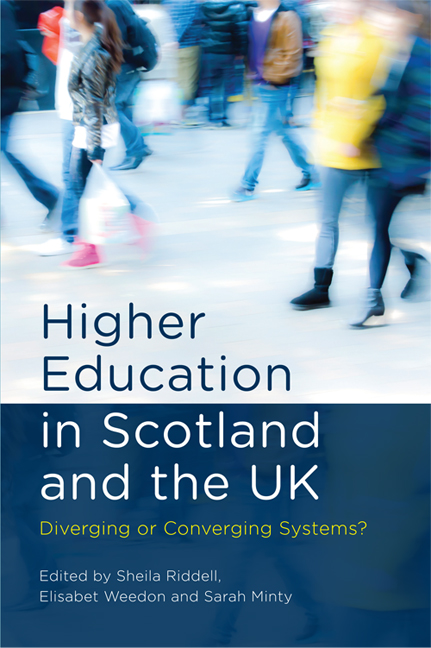Book contents
- Frontmatter
- Contents
- Figures
- Tables
- Acknowledgement
- The Contributors
- Dedication
- 1 Scottish Higher Education and Devolution
- 2 Higher Education Governance and Institutional Autonomy in the Post-devolution UK
- 3 Student Funding in the UK: Post-Devolution Scotland in a UK Context
- 4 Young People–s Attitudes towards Student Debt in Scotland and England
- 5 Cross-border Flows of Students within the UK
- 6 Widening Access to Higher Education in Scotland, the UK and Europe
- 7 The Internationalisation of Higher Education in Scotland and the UK
- 8 Research Policy in Scotland and the Rest of the UK
- 9 Devolution and Higher Education Policy: Negotiating UK and International Boundaries
- Appendix 1 Research Methods
- Appendix 2 List of Acronyms
- Index
2 - Higher Education Governance and Institutional Autonomy in the Post-devolution UK
Published online by Cambridge University Press: 05 August 2016
- Frontmatter
- Contents
- Figures
- Tables
- Acknowledgement
- The Contributors
- Dedication
- 1 Scottish Higher Education and Devolution
- 2 Higher Education Governance and Institutional Autonomy in the Post-devolution UK
- 3 Student Funding in the UK: Post-Devolution Scotland in a UK Context
- 4 Young People–s Attitudes towards Student Debt in Scotland and England
- 5 Cross-border Flows of Students within the UK
- 6 Widening Access to Higher Education in Scotland, the UK and Europe
- 7 The Internationalisation of Higher Education in Scotland and the UK
- 8 Research Policy in Scotland and the Rest of the UK
- 9 Devolution and Higher Education Policy: Negotiating UK and International Boundaries
- Appendix 1 Research Methods
- Appendix 2 List of Acronyms
- Index
Summary
INTRODUCTION
Devolution was expected to redistribute power within each ‘home country’ of the UK as well as between each country and the UK centre. It was to herald a more open, participatory and inclusive form of democracy. It would bring government closer to public institutions such as universities, and help these institutions to contribute to the economic, social and cultural development of their host societies.
Devolution thus presented both opportunities and threats for universities. It brought higher education closer to government, and closer to the centre of national life. It made higher education more visible as an area of public policy, and strengthened its claim on the public purse as a core institution and contributor to society. It gave universities more influence over policy debates, especially in a country such as Scotland where trust in professionals and providers of public services remained relatively high. It enabled the leaders of higher education – both institutional leaders and representatives of the sector as a whole – not only to have the ear of government but also to play a more active role in shaping policy than would have been conceivable beforehand. But devolution also presented threats. It brought higher education closer to government, but by the same token it brought government closer to higher education. It exposed universities to greater legislative and executive scrutiny than had been possible under the Westminster regime. It encouraged and enabled devolved governments to take a closer interest in the day-to-day activities of universities, in the interests both of democratic accountability and of maximising their economic, social and cultural contributions. And it tempted governments to tighten their controls over universities – in the eyes of some, threatening institutional autonomy.
In this chapter I review these tensions as they have played out in the years since devolution, with a primary focus on Scotland. The chapter starts with a narrative of the governance of Scottish higher education following administrative devolution in 1992 and especially parliamentary devolution in 1999. The narrative focuses on the relations between universities and government. The internal governance of institutions is of interest primarily as a test of this relationship: if the government takes an interest in how universities are run, is this a legitimate expression of its democratic mandate or an unwanted interference in the internal affairs of autonomous institutions (Murray et al., 2013)?
- Type
- Chapter
- Information
- Higher Education in Scotland and the UKDiverging or Converging Systems?, pp. 19 - 32Publisher: Edinburgh University PressPrint publication year: 2015



